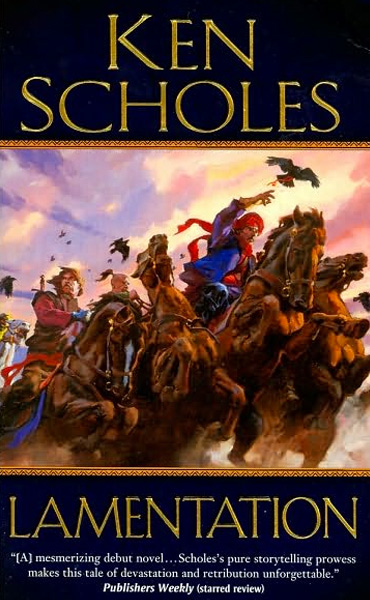The Genre-Blending Epic The Psalms of Isaak

I’ve written extensively over the past decade on the changing landscape of genre fiction: the rigidly defined boundaries between genre categories have all but blurred into nonexistence, making way for a new kind of story that boldly blends elements from science fiction, romance, mystery, horror, and more.
Yes, this kind of narrative has been around for decades—but today, genre-blending novels are everywhere. Look at any bestseller list for proof: Janet Evanovich, Jim Butcher, Charlaine Harris, Laurell K. Hamilton, Sylvia Day, J. D. Robb, Nicole Peeler—the list goes on and on. The reason why these stories are so phenomenally popular is simple: the fusion of seemingly disparate fictional elements (for example, space exploration and vampires) gives writers virtually limitless potential for stories, and gives readers wildly original and (hopefully) wildly entertaining literary escapism.
One of the best examples of this new breed of fiction is The Psalms of Isaak, by Ken Scholes, a five-volume saga (the fifth, Hymn, is forthcoming) that is redefining epic fantasy and science fiction.
As the first novel (Lamentation) begins, readers are instantly immersed in Windwir, “the world’s greatest city,” home to the Androfrancine Order and their Great Library—as it is literally wiped off the face of the earth by an unknown weapon. Amidst the chaos, unlikely heroes arise to save what remains of the library (the world’s “greatest repository of knowledge and artifacts”), to bury the hundreds of thousands of dead, and to begin the slow, seemingly impossible process of uncovering the conspirators behind the heinous act. Among the few survivors are the mechoservitors (“metal men”) who aided the Androfrancines in their work. One metal man, nicknamed Isaak, may be the only one who knows what happened—and why.
Powered by an ensemble cast of magnificently developed characters—the heroic Gypsy King Rudolfo, Lord of the Ninefold Forest; the scheming Vlad Li Tam, who uses his 37 sons and 53 daughters as pawns in a grand-scale game of espionage; an old fisherman named Petronus, who is much more than he seems; Nebios, a teenaged orphan who witnessed the Desolation of Windwir; Mechoservitor Number Three (aka, Isaak), the mechanical who is in many ways more human than his flesh-and-blood companions—Lamentation is, at least superficially, the beginning of what seems to be an epic fantasy saga, a la George R.R. Martin’s A Song of Ice and Fire and Robert Jordan’s Wheel of Time.
But there are tantalizing hints, even early on, of something more, a barely acknowledged postapocalyptic storyline intertwined with the epic fantasy narrative. The moon is blue-green. There is an area known as the Churning Wastes that resembles a kind of nuclear fallout zone. Ancient history references an Old World, Young Gods, and an Age of Laughing Madness….
The series’ fourth volume, Requiem, is easily the most stunning installment yet. The narrative bombshells drop fast and furious, and readers who have read the three preceding books (Lamentation, Canticle, and Antiphon) should prepare to have their jaw drop. Scholes is not only an extraordinarily gifted storyteller, he’s a master maze builder. Constructing a labyrinthine storyline with such breathtaking scope and with so many blockbuster plot twists and revelations buried throughout is simply awe-inspiring. Epic fantasy fans will be blown away by this saga’s breathtaking realm building, character development, and tantalizingly complex storyline, while science fiction fans will find the speculation and social commentary to be brilliant, comparable to the postapocalyptic classic A Canticle for Leibowitz.
Here is a fitting excerpt from Requiem: “His mind reeled from the weight of a history he’d never imagined—a species that crawled out of the oceans and into the stars, carrying its cycle of self-destruction and survival for millions of years.” Yes, a saga that succeeds both as an epic fantasy and as visionary science fiction seems unlikely, but, to paraphrase a line from Requiem, unlikely is perhaps heaven’s most fluent language.
Are you going to read The Psalms of Isaak?